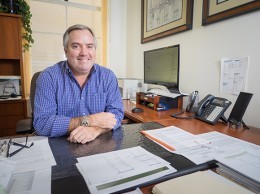By Jean-Luc Bourdon on February 24, 2012
Everyone seems to have an opinion about whether or not money buys happiness. As such, the issue has gathered interest for centuries. The inverse question is less common, but equally interesting: Does happiness buy money?
Today, much research brings answers to those questions. That is why the American Institute of CPAs recently invited Dr. Rober Biswas-Diener, a psychology researcher, to share his insights at their annual Personal Financial Planning Conference.
Dr. Biswas-Diener, known as the “Indiana Jones of positive psychology,” has traveled the globe to conduct research on income and happiness. His presentation first showed that people all over the world, on average, find happiness to be more important than being good-looking, gaining money, falling in love or even getting into heaven!
Researchers not only measured how important happiness is, but also what some of its benefits are. For instance, there is a highly predictive correlation between happiness and health. Research shows that, the higher our cheerfulness level, the higher our ability to fight diseases and the longer our lifespan. Happiness is also linked to enhanced perseverance at tasks, volunteerism and creativity.
As such, the pursuit of happiness has tangible benefits—many relevant to business. The validated importance and benefits of happiness make the original question all the more significant: Does money buy happiness?
Overwhelmingly, the audience of CPA financial planners thought that it does not—a rather interesting point of view from professionals who, over the years, discuss their clients’ money and life.
In the 1980s, Biswas-Diener’s father, also a psychologist, had researched happiness among individuals with a minimum net-worth of $125 million. That research revealed that wealthy individuals generally experienced significantly more happiness than the average person. Also, many of them found a real sense of purpose in the world. Time and again, researchers heard: “I had a mission and made it a business that became fabulously successful. The money is nice, but it’s not my motive.” This leads to a chicken-or-egg causality dilemma: which comes first, happiness or money?
Looking at the question from a much different viewpoint, Biswas-Diener went to the slums of Calcutta and interviewed people at the bottom of the economic scale. People in Calcutta were quite happy with many aspects of their lives (i.e. relationships, self-image) although they were dissatisfied with their material resources (i.e. health care, housing, transportation). So, money can improve happiness by affording comfort. However, relationships and self-image seem more important overall.
Psychologists found that wanting money and having money bring different happiness outcomes. Those who believe that money is very important and love is very unimportant rank very low on the happiness scale. Those who believe love is very important and money is somewhat unimportant are the happiest. So, there is a “materialism caveat”: money gives us many tangible benefits that enhance our lives, but wanting money makes us unhappy. Dr.
Biswas-Diener’s conclusion is: Money buys a bit of happiness, but valuing money over relationships is toxic to happiness.
Now, does being happy bring more money? The audience of about 900 CPA financial planners unanimously believed so. The research presented ranked on a 5-point scale the level of cheerfulness expressed by college freshman, and well as their related income 20 years later. From 1 to 4, a higher cheerfulness level was associated with significantly higher earnings later in life.
However, students at cheerfulness level 5, made less money than students at level 3. Therefore, up to a point, increased happiness leads to more income. Past that point, it leads to less income. To maximize income potential, it helps to be happy, but not extremely happy. The same correlation applies to other achievements. Happier students have better grades and happier employees have better customer and supervisor evaluations, take fewer sick days, and have more frequent promotions — up to a point from which achievement decreases.
As we work on our business and personal financial-plans, it would therefore be helpful to build them to pursue happiness, rather than strictly financial goals. Kinko’s Founder Paul Orfalea famously said: Happy fingers ring happy cash registers.
Now, psychology research adds that focusing on what makes us happy and keeping money in proper perspective could very well give us the best of health, wealth and happiness.
• Jean-Luc Bourdon is a CPA financial planner with Kozak Financial Advisory in Camarillo. He writes a column for CPA Insider as a wealth management expert. Contact him at (805) 764-0335.






 Print
Print Email
Email















